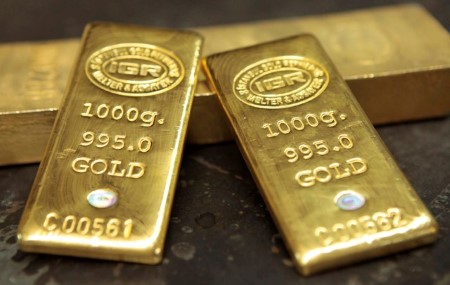




Policy Rate Updates: BSP outlook — cloudy with a chance of rate cut
 DOWNLOAD
DOWNLOAD

January Economic Update: Growth slows, prices rise
 DOWNLOAD
DOWNLOAD

Inflation Update: Up, up, and away?
 DOWNLOAD
DOWNLOAD


Gold surges as Middle East tensions spur safe-haven rush

April 12 – Gold prices rose above USD 2,400 per ounce to an all-time high on Friday, heading for their fourth week of gains, as growing tensions in the Middle East prompted investors to seek refuge in the safe-haven assets.
Spot gold eased 0.8% to USD a2,353.35 per ounce as of 1:40 p.m. ET (1740 GMT), taking a breather after hitting a record high of USD 2,419.79. Prices were up around 1% for the week.
US gold futures settled 0.1% higher at USD 2,374.1.
Taking cues from gold’s upward momentum, platinum tested the key USD 1,000 per ounce level to its highest level in nearly four months.
“What’s really telling about the strength of gold is the US dollar index and Treasury yields are climbing, yet gold continues to rally strongly – that’s very indicative of strong safe-haven demand,” said Jim Wyckoff, senior analyst at Kitco Metals.
A reportedly imminent attack by Iran on Israel is a real and viable threat, the White House said, giving no details about possible timing, reiterating that the US takes its commitments to defend Israel seriously.
“Gold continues to go from strength to strength as we are witnessing fear of missing out on clear display,” Ole Hansen, head of commodity strategy at Saxo Bank, said in a note.
Gold’s recent surge arrived despite traders dialing back bets for an early interest rate cut from the Federal Reserve.
“Gold has pushed back against some data that should have typically been negative. It will be somewhat healthy to see a correction in the bull’s market, but the trend will continue to be positive,” said Chris Gaffney, president of world markets at EverBank.
Meanwhile, Goldman Sachs hiked its year-end gold price forecast to USD 2,700 per ounce from USD 2,300, citing the metal’s bull market’s indifference to the usual macro factors.
Spot silver fell 1% to USD 28.21 per ounce, after touching its highest level since early 2021. Platinum rose 0.6% to USD 985.65 and palladium firmed 0.9% to USD 1,055.62.
All three metals were poised for weekly gains.
(Reporting by Ashitha Shivaprasad, Brijesh Patel, and Anjana Anil in Bengaluru; Editing by Vijay Kishore and Alan Barona)
This article originally appeared on reuters.com





 By Reuters
By Reuters